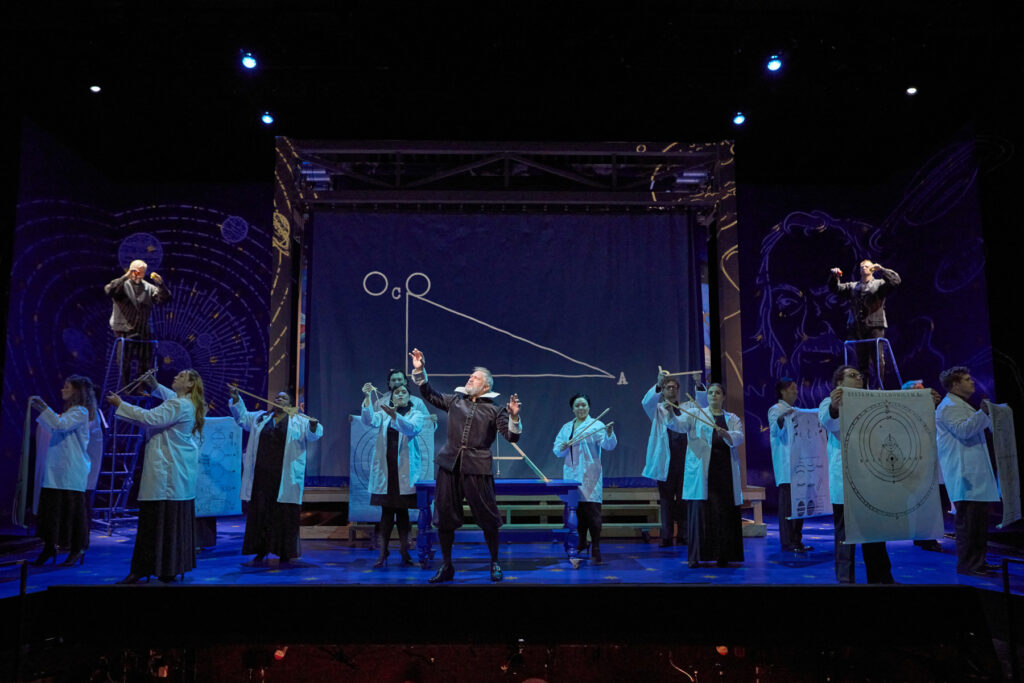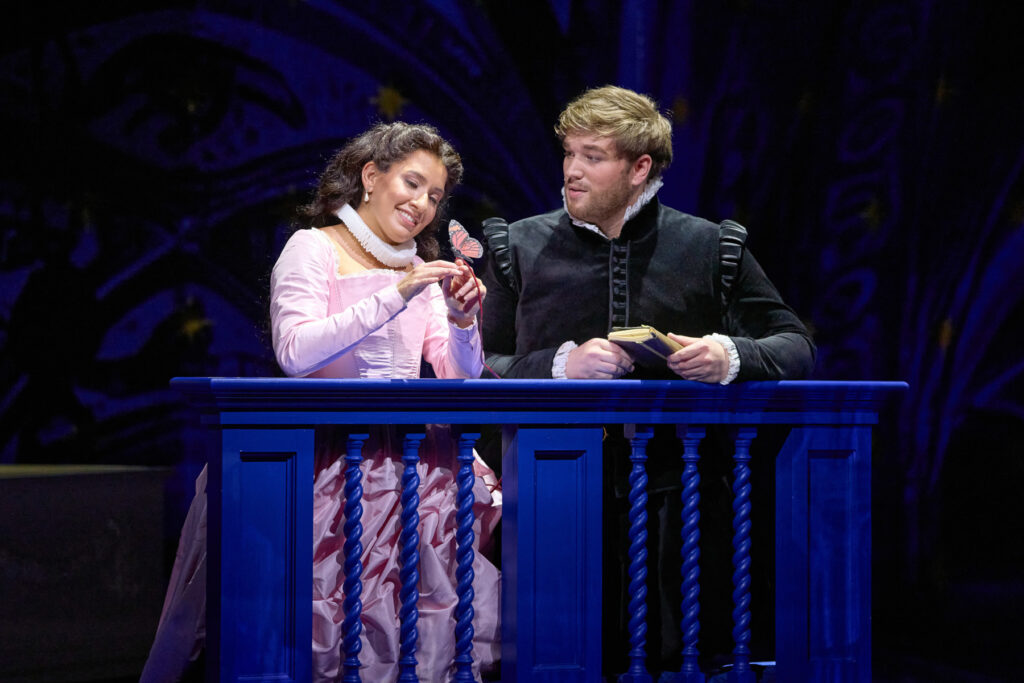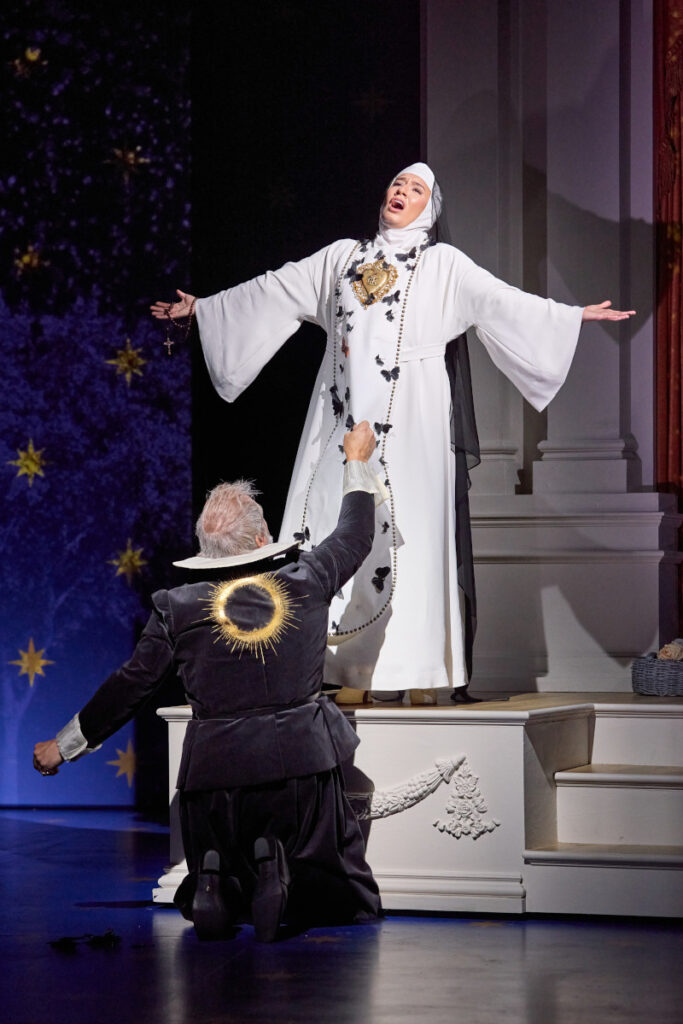You don’t need a telescope to spot the stars in Opera Theatre of Saint Louis’ winning and sumptuous production of Philip Glass and Mary Zimmerman’s Galileo Galilei. They are all over the stage.
This consistently excellent company has fielded a truly stellar team of singers, instrumentalists and creative artists to make a very persuasive case for this fascinating but flawed ninety minute opera in ten scenes, that tackles personal integrity, science denial, religious oppression, and familial loss. And, improbably, it moves backward in time. Yes, backwards.
There is a famous quote about Ginger Rogers doing everything that Fred Astaire did so dazzlingly, but backwards and in high heels. In the case of Galileo Galilei, I felt the retrograde movement which aspired to be thought-provoking, was often a bit stumbling and spikey. Perhaps Mr. Glass needed a more graceful partner than Mary Zimmerman’s spare and confusing libretto, that made it difficult at times to recall who was who, and when was when.
Luckily, the superb cast knew “exactly” who each of their characters were, and by sheer and utter commitment, and with wholly admirable vocalizing, they communicated a steady and illuminating parade of interesting opinions and scenarios.

Veteran redoubtable tenor Paul Groves was nigh unto perfection as the Older Galileo Galilei. He did not so much perform the role as embody it, and his seasoned, poised instrument has just the right combination of evenness, polish, gravitas, and maturity. He dominated the opening scenes, and his presence was missed as his character was replaced by Younger Galileo in the second half.
The composer has been especially generous in creating so many memorable opportunities for lower male voices, and man, did OTSL ever deliver the goods. In the multiple roles of Pope Urban VIII/Cardinal Barberini, Simplicio, and Father, bass-baritone Hunter Enoch regaled us with a thundering, orotund, delivery that rolled out with imposing authority. Moreover, Mr. Enoch was able to delineate these four characters with admirable distinction.
Robert Mellon skillfully deployed his warm, ringing baritone with equal distinction in a trio of parts: Cardinal 2, Servant, and Oracle 2. Mr. Mellon not only sings the roles to finely differentiated effect, he also proved to be a splendid actor possessed of superior stage presence. His moments as the obsequious Servant who toadies to the Duchess and her ladies proved a memorable comic turn, and one of the highpoints of the production.
Young Jared Werlein showed off a well-schooled, formidable bass-baritone in his stage time as Cardinal 3. Elijah English’s secure, substantial counter tenor did triple duty as Cardinal 1, Oracle 1, and one of the Others, the latter group also including excellent work by fellow countertenor Luke Elmer, with baritones Emilio Vasquez, and David Wolfe. These outstanding Gerdine Young Artists more than held their own in key scenes alongside seasoned pros.

On the distaff side, there was also much to admire. Vanessa Becerra nailed her first extended solo as Maria Celeste, meeting the demands of the high tessitura with a limpid yet wonderfully focused soprano. We meet this character well on into her brief life, after she has become a nun. In a subsequent scene, earlier in time, she brought an infectious silvery girlishness into her delivery, that I wish had been a bit more present in the prior convent scene. As Eos, Ms. Becerra effectively weighted her phrasing with import and a hint of manufactured heft.
Duchess Christina is required to come on like gangbusters, and Kathleen O’Mara certainly had an exceptional vocal arsenal at her disposal. Ms. O’Mara’s sizable soprano was resonant and even in all registers and volumes, and it soared into the house with genuine beauty and awesome control. Her stage presence was similarly affecting.
Gabriela Linares has such a warm, supple mezzo that it not only fell easily on the ear, but also struck all the right impressions as a self-assured Scribe. Jennifer Kreider’s impersonation of Sagredo was infectious and appealing, her bright, well-tutored soprano sporting zing and polish. Filling in for the indisposed Lucie Evans, Olivia Prendergast seamlessly contributed a poised silvery-voiced interpretation as Marie de Medici. She was well matched by her sister lady in waiting, Maria Maddalena, who was well-served by Michelle Mariposa’s plummy, imperious mezzo-soprano.
Before I comment on the remaining principal role, I pause to reflect that this production of Galileo Galilei could hardly have been improved, starting with a spell-binding musical realization of Glass’s ‘formulaic’ score. You know what you are going to get from this composer: repetitive arpeggiated phrases, accented rhythms challenged by other percussive stings, staccato commentary, and sustained chords serving as a different kind of cantus firmus, to name a few.
Under Kwamé Ryan’s steady baton, every calculated effect was dutifully allowed its proper place. There is a marginally different “Glass sound” to this score, the 13-piece orchestra comprised disproportionately of lower voices. The occasional, welcome brightness from higher winds lends some aural color, but the overall effect seemed a preponderance of a restive weightiness, in both music and Ms. Zimmerman’s knotty text.
That the music–making never became pedestrian or tiresome was a great credit to the poised, fleet, polished playing from the members of the Saint Louis Symphony in the pit. Maestro Ryan’s impressive concentration never wavered, and he commandeered his amassed forces through even the most challenging writing with insight and skillful aplomb. He was in full mastery of the most minute shifts of the sound palette, and he infused the final expansive choral statement with a marvelous, inexorable build.
As we have come to expect at OTSL, each and every element of the design was top tier. Allen Moyer’s ingenious set design magically morphed into the varied settings with breath taking grace and remarkable efficiency. A period architectural stage-within-a-stage handsomely dominates the playing space, and it is wonderfully spun, dressed and redressed with spot-on accessories, furniture, and props that immediately establish the place and mood. I especially enjoyed the goof of the imaginative and playful three piece “gondola” in the Venice scene.

Mr. Moyer is ably abetted by two renowned artists: Greg Emetaz and Eric Southern. Mr. Emetaz has crafted his customary evocative projection design that lifts the proceedings from the natural to the surreal and back again, incorporating some of Galileo’s own sketches and writings into the dazzling display. In his lighting design, Mr. Southern has unleashed his expected wide-ranging palette of colors and effects, that establish the perfect mood for every occasion, from sober confrontations to serene, cloistered convent life, to rapturous celebrations, to prankish sendups of court life.
To add to this embarrassment of riches, Marco Piemontese has designed an array of lavish costumes that are not only stunningly attractive, but which also immediately established and defined the characters. Given this true visual banquet, we might be forgiven were we to come out “humming the scenery.” But director James Robinson and his talented “Team GG” have accomplished a considerable success in performing this rarity with uncommon enthusiasm and exactitude.
Mr. Robinson specializes in successfully staging these sort of highly theatrical pieces, which are often non-linear, mosaic-like, and a series of “impressions” that need to be knit into a unified whole. He is a master at it, and Galileo Galilei is yet another highpoint in his illustrious career. He and his design team know this venue well, and especially, the limitations of the Loretto Hilton stage. Robinson once again found every opportunity to use fluid groupings, sincere character interaction, varied levels and areas, clever and eye-catching stage business, and pointed entrances/exits to fully engage the audience in an infectious feat of storytelling.
Best Observation for Last:
In a curtain speech, Andrew Jorgensen had to tell the audience what no General Director ever wants to say. Star baritone Sean Michael Plumb was ill and could not perform the critical roles of Younger Galileo Galilei and Salviati. Being the wonderful company it is, OTSL has a cover for every role fully prepared to ensure the show will go on. The cover. . .was also ill. As luck would have it, the second cover could sing the role, but. . .did not know the stage action. So:
Baritone David Wolfe, a Gerdine Young Artist, sang the role of Younger Galileo/Salviati from the side of the stage, while standing on stage enacting those roles (but not singing) was Ian Silverman, Assistant Stage Director. Mr. Silverman, very lean and slight of stature, in horn rimmed glasses, and with a hastily arranged cap and tunic, appeared decidedly ill at ease, and his first gamely done gestures as a disembodied voice intoned the music had a sort of Waiting-for-Guffman-community-theatre send-up effect to them.
But then Silverman relaxed into his assignment, the rest of the highly motivated and determined cast were rock solid in their well-rehearsed interactions with the characters of Younger Galileo Galilei and Salviati, and most important, Mr. Wolfe sang like a god-to-the-rescue, his buzzy, virile delivery throbbing with a highly pleasing aural presence.
The show was not only saved, but Wolfe and Silverman triumphantly received the evening’s most vociferous ovation from an admiring and grateful crowd. For this fortunate happenstance, and all the hallmarks of excellence outlined above, this was certainly a night to remember from one of the nation’s leading opera companies. Bravi tutti!
James Sohre
Galileo Galilei
Music by Philip Glass
Libretto by Mary Zimmerman with Philip Glass and Arnold Wesintein
Older Galileo Galilei/Speaker: Paul Groves; Cardinal 2/Servant/Oracle 2: Robert Mellon; Cardinal 3: Jared Werlein; Pope Urban VIII/Simplicio/Cardinal Barberini/Father: Hunter Enoch; Cardinal 1/Oracle 1/Other: Elijah English; Others: Luke Elmer, Emilio Vasquez, David Wolfe; Maria Celeste/Eos: Vanessa Becerra; Scribe: Gabriela Linares; Salviati/Younger Galileo Galilei: David Wolfe and Ian Silverman ; Sagredo: Jennifer Kreider; Priest: Brad Brickhardt; Marie de Medici: Olivia Prendergast; Maria Maddalena: Michelle Mariposa; Duchess Christina: Kathleen O’Mara; Conductor: Kwamé Ryan; Director: James Robinson; Set Design: Allen Moyer; Costume Design: Marco Piemontese; Video Projection Design: Greg Emetaz; Lighting Design: Eric Southern; Choreographer: Seán Curran; Make-up and Hair Design: Krystal Balleza and Wilt Vicari; Chorus Master: Andrew Whitfield
Top Image: Paul Groves as Older Galileo.
All photos © Eric Woolsey.